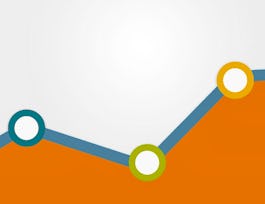The fourth course in the Salesforce Sales Operations Professional Certificate — Reports, Dashboards, and Customer Success in Salesforce — is for anyone who is curious about entry level sales roles that require foundational skills in Salesforce, the sales operations specialist role specifically, how to use tools in Salesforce to improve customer service at a business, how to leverage data in Salesforce to improve the overall performance of a sales team, and the path to becoming a Salesforce administrator.



Reports, Dashboards, and Customer Success in Salesforce
This course is part of Salesforce Sales Operations Professional Certificate


Instructors: Angela Prakash
Sponsored by PTT Global Chemical
19,419 already enrolled
(210 reviews)
Recommended experience
What you'll learn
Understand and properly perform service/support agent processes using the Salesforce Case Management and Knowledge features in the Service Cloud.
Identify the value of using the Sales Cloud to create reports to track, improve, and forecast various aspects of the sales process.
Build reports, charts and dashboards to communicate relevant information about sales performance to stakeholders and executives.
Skills you'll gain
Details to know

Add to your LinkedIn profile
14 assignments
See how employees at top companies are mastering in-demand skills

Build your Business Essentials expertise
- Learn new concepts from industry experts
- Gain a foundational understanding of a subject or tool
- Develop job-relevant skills with hands-on projects
- Earn a shareable career certificate from Salesforce


Earn a career certificate
Add this credential to your LinkedIn profile, resume, or CV
Share it on social media and in your performance review

There are 4 modules in this course
Welcome to the first week of Reports, Dashboards, and Customer Success in Salesforce, the fourth and final course in the Salesforce Sales Operations Professional Certificate! This week, you'll learn about the final stage of the sales process: Customer Success. You’ll also learn more about the customer success manager (or CSM) role, how you can support that role as a sales ops specialist, and you'll dive into the Service Cloud to fully understand what tools are available to you to make sure that a CSM is doing their job as efficiently and effectively as possible.
What's included
5 videos14 readings3 assignments2 discussion prompts
Welcome to the second week of Reports, Dashboards, and Customer Success in Salesforce! This week, you are going to go even deeper into the Service Cloud and work hands on with customer success tools in Salesforce through the Guided Project experience. In these Guided Projects, you will learn how you can leverage Salesforce to empower CSMs to do their jobs as effectively and efficiently as possible by working with cases and exploring other features like Knowledge and the Service Console. At the end of this week, you will also tackle your first independent project in this course, which will give you an opportunity to explore a business use case in Salesforce, hands on. By completing this project, you will be able to create a valuable portfolio piece and work sample that you can use during your future job search.
What's included
1 video12 readings3 assignments1 discussion prompt2 ungraded labs
Welcome to the third week of Reports, Dashboards, and Customer Success in Salesforce! This week, you are going to dive into a new role — the sales manager and learn how to best support the different needs of that role by leveraging Salesforce data in the form of reports. Knowing how to parse through Salesforce data, understand what’s most important, and use that targeted data to solve specific business problems is an incredibly valuable skill to have. There are many reasons why it’s valuable to leverage Salesforce data to solve real world problems, some of which include the ability to track, improve, and forecast the performance of a sales team in order to make sure that the team is hitting its goals — which you’ll learn more about this week!
What's included
4 videos12 readings5 assignments1 discussion prompt
Welcome to Week 4, the final week of Reports, Dashboards, and Customer Success in Salesforce! This week, you'll learn how to create visualizations of the data in your Salesforce reports using report charts and dashboards. Creating these visualizations for sales managers, and other sales team members, can be an incredibly effective way to highlight key metrics so that sales teams can make informed, data-driven decisions on the job — helping them achieve their collective goals and hit their target sales revenue. At the end of this week, you will also tackle your final independent project in this course, which will give you an opportunity to explore a business use case in Salesforce, hands on. By completing this project, you will be able to create a valuable portfolio piece and work sample that you can use during your future job search.
What's included
3 videos15 readings3 assignments2 discussion prompts2 ungraded labs
Why people choose Coursera for their career




Learner reviews
210 reviews
- 5 stars
80.18%
- 4 stars
13.67%
- 3 stars
0.94%
- 2 stars
0.47%
- 1 star
4.71%
Showing 3 of 210
Reviewed on Mar 9, 2023
This is an interesting course, my favorite part is Dashboard, it helps in visualizing your data at a glance. I love it! Thank you Coursera.
Reviewed on Jun 26, 2024
Absolutely loved the "tell me, show me, now you do it" flow of this class
Reviewed on Sep 21, 2022
very informative and loaded with great materials. You learn alot and get a good understanding of tools within salesforce.
Recommended if you're interested in Business

University of Virginia

West Virginia University

Coursera Instructor Network

Universidades Anáhuac

Open new doors with Coursera Plus
Unlimited access to 10,000+ world-class courses, hands-on projects, and job-ready certificate programs - all included in your subscription
Advance your career with an online degree
Earn a degree from world-class universities - 100% online
Join over 3,400 global companies that choose Coursera for Business
Upskill your employees to excel in the digital economy




